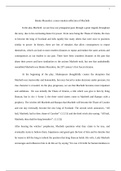Dissertation
Macbeth vs Mussolini : Comparing their dictatorships
- Cours
- Établissement
- Book
In this 5 page essay, I compared the rise and fall of Macbeth to the famous tyrant Benito Mussolini. I have compared and contrasted their similarities and differences and have shown how "Those who do not learn history are doomed to repeat it.".
[Montrer plus]



